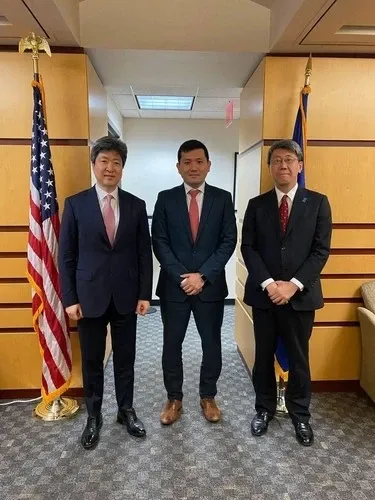How are the US, South Korea, and Japan Reinforcing Their Commitment to Trilateral Cooperation?

Synopsis
Key Takeaways
- Trilateral Cooperation: Emphasis on enhancing cooperation between the three nations.
- Shared Vision: Commitment to a free and open Indo-Pacific.
- Addressing Challenges: Focus on regional threats and global challenges.
- Institutionalization: Establishment of the secretariat for operationalizing agreements.
- Future Collaboration: Exploration of new avenues for effective cooperation.
Seoul, May 20 (NationPress) Diplomats from South Korea, the United States, and Japan gathered in Washington on Monday for a meeting of their trilateral secretariat managing board to reaffirm the three nations' steadfast commitment to enhancing three-way collaboration, according to the US State Department.
Yi Won-woo, the deputy director-general for North American affairs at Seoul's foreign ministry; US Deputy Assistant Secretary of State for China, Japan, Korea, Mongolia, and Taiwan, Kevin Kim; and Akihiro Okochi, deputy director-general for Asian and Oceanian affairs at Japan's foreign ministry, spearheaded the discussions at the Trilateral Coordinating Secretariat Managing Board.
The meeting highlighted a shared vision for a free and open Indo-Pacific and emphasized the necessity of institutionalizing collaboration in the realms of economic, security, and people-to-people interactions, as stated in a media notice from the department.
Board members reviewed recent advancements in trilateral cooperation and deliberated on future steps to enhance coordination, boost information sharing, and fortify joint responses to both regional and global challenges, according to the department.
The Managing Board reiterated its ongoing support for the Secretariat's initiatives aimed at operationalizing trilateral outcomes and maintaining momentum across key areas of focus.
In November, the trio announced the creation of the secretariat to formalize trilateral cooperation amid various regional and global challenges, including North Korea's escalating nuclear and missile threats, Russia's invasion of Ukraine, and China's increasing assertiveness, as reported by the Yonhap news agency.
Discussions on Monday also covered significant regional challenges and evaluated the current status of recent trilateral cooperation initiatives, as indicated by Seoul's foreign ministry in a statement following the talks.
The three nations explored avenues for enhancing future collaboration and discussed ways to expand the secretariat's role to make trilateral cooperation more effective and substantive.










